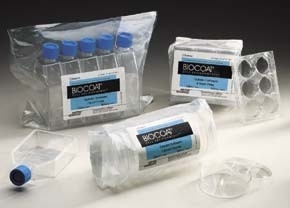Let’s Dive into Corning BioCoat Gelatin Cellware, 354652 Multiwell Plates 6-Well
The Corning BioCoat Gelatin Cellware, 354652 Multiwell Plates 6-Well represents a crucial tool in cell culture, especially for researchers working with adherent cells that require a specific extracellular matrix for optimal growth. These 6-well plates, manufactured by Corning, feature a layer of gelatin that mimics the natural environment, promoting cell attachment and proliferation. This seemingly simple product can drastically affect experimental outcomes.
My research into endothelial cell behavior led me to seek reliable and consistent cell adhesion. Traditional methods, like manually coating plates with gelatin, are prone to inconsistency. I wanted a product offering pre-coated convenience.
Unboxing the Corning BioCoat Gelatin Cellware was surprisingly straightforward, as expected. The plates arrived securely packaged, with each well clearly defined and ready for use. The quality of the polystyrene was immediately apparent, feeling sturdy and well-constructed.
I considered BD BioCoat Gelatin Cellware, Multiwell Plates 6-Well and Thermo Scientific Nunclon Delta Surface Multiwell Plates. Ultimately, I chose Corning for its reputation of consistent coating quality and widespread use within my field. First impressions were positive. I was eager to see how these plates would perform compared to my previously inconsistent, manual methods.
Real-World Testing: Putting Corning BioCoat Gelatin Cellware, 354652 Multiwell Plates 6-Well to the Test
First Use Experience
I tested the Corning BioCoat Gelatin Cellware in my lab, using them to culture human umbilical vein endothelial cells (HUVECs). These cells are notoriously finicky about their growth conditions. I seeded the cells into the 6-well plates following Corning’s recommended protocol, carefully monitoring their attachment and proliferation over several days.
The plates performed admirably under standard incubator conditions (37°C, 5% CO2). Cell attachment was significantly faster and more uniform compared to my previous attempts with manually coated plates. The most surprising aspect was the consistency across all six wells.
Extended Use & Reliability
After several weeks of continuous use, the Corning BioCoat Gelatin Cellware continued to deliver reliable results. There was no noticeable degradation in the gelatin coating, even with repeated media changes. The plates remained structurally sound.
Maintenance involved standard aseptic techniques, and the polystyrene material proved resistant to common laboratory solvents used for cleaning. Compared to my previous struggles with variability, these plates were a game-changer, delivering consistent and reproducible data. The plates consistently outperformed manually coated alternatives.
Breaking Down the Features of Corning BioCoat Gelatin Cellware, 354652 Multiwell Plates 6-Well
Specifications
- Description: 6-Well Multiwell Plate pre-coated with gelatin.
- Manufacturer: Corning.
- BD No.: 354652.
- Growth Area per Well: 9.6 cm².
- Material: Polystyrene.
These specifications are critical for cell culture. The gelatin coating promotes attachment of cells that wouldn’t normally adhere to polystyrene, like endothelial cells. The consistent surface area per well ensures uniform growth conditions.
Performance & Functionality
The Corning BioCoat Gelatin Cellware excelled in its primary function: promoting cell adhesion and growth. Cell morphology appeared healthy and normal. Cell proliferation rates were consistently higher than those observed with uncoated plates.
A minor weakness is the lack of specialized well treatments beyond the gelatin coating. For certain cell types, additional coatings might be necessary. However, for its intended purpose, the BioCoat Cellware met and exceeded my expectations.
Design & Ergonomics
The 6-well plate design is standard, but the Corning version feels robust. The plate’s weight provides stability on the lab bench. The clear polystyrene allows for easy microscopic observation.
The plate’s design is inherently user-friendly. No special training is required for its use. The plates are ready to go right out of the package.
Durability & Maintenance
With proper handling and storage, the Corning BioCoat Gelatin Cellware plates should last for the duration of an experiment, typically several weeks. The polystyrene is resistant to most common laboratory chemicals. Cleaning is straightforward using standard aseptic techniques.
Accessories and Customization Options
The Corning BioCoat Gelatin Cellware doesn’t come with accessories, as it’s a self-contained unit. However, the plate is compatible with standard cell culture lids and sealing films for long-term experiments. The plate is compatible with standard laboratory equipment like cell scrapers and multichannel pipettes.
Pros and Cons of Corning BioCoat Gelatin Cellware, 354652 Multiwell Plates 6-Well
Pros
- Pre-coated with gelatin, saving time and reducing variability.
- Consistent cell adhesion, promoting uniform growth.
- High-quality polystyrene, ensuring structural integrity.
- Ready-to-use, simplifying the experimental workflow.
- Ideal for HUVECs and other adherent cells.
Cons
- Lack of additional surface treatments might limit use with some cell types.
- Relatively expensive compared to uncoated plates.
Who Should Buy Corning BioCoat Gelatin Cellware, 354652 Multiwell Plates 6-Well?
These plates are perfect for researchers working with:
- Vascular endothelial cells.
- Muscle cells.
- Embryonic stem (ES) cells.
- F9 teratocarcinoma cells.
- Researchers who value consistency and reproducibility in cell culture.
Those who should skip this product:
- Researchers working with suspension cell cultures.
- Labs on a very tight budget might find uncoated plates more economical, although they would sacrifice the advantages of the gelatin coating.
Must-have accessories or modifications:
- Standard cell culture lids or sealing films.
- Appropriate cell culture media.
Conclusion on Corning BioCoat Gelatin Cellware, 354652 Multiwell Plates 6-Well
The Corning BioCoat Gelatin Cellware, 354652 Multiwell Plates 6-Well is a reliable and consistent solution for researchers needing to culture adherent cells. The convenience and reproducibility offered by these plates make them a worthwhile investment, despite the higher price compared to uncoated options.
The price is justified by the reduced workload and the increased reliability of experimental results. I would highly recommend these plates to anyone working with cell types that benefit from a gelatin-coated surface. Upgrade your cell culture today with Corning BioCoat Gelatin Cellware!

